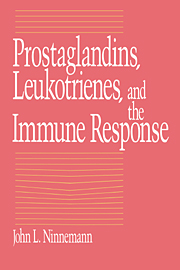Book contents
- Frontmatter
- Contents
- Foreword by James S. Goodwin
- Preface
- 1 A brief history and introduction
- 2 Prostaglandin/leukotriene structure and chemistry: a primer
- 3 Monocytes and macrophages
- 4 Lymphocyte response
- 5 Inflammation and the neutrophil
- 6 Malignancy and the arachidonic acid cascade
- 7 Tissue and organ transplantation
- 8 Rheumatoid arthritis and autoimmunity
- 9 Traumatic injury and surgery
- 10 Allergy
- Index
9 - Traumatic injury and surgery
Published online by Cambridge University Press: 24 November 2009
- Frontmatter
- Contents
- Foreword by James S. Goodwin
- Preface
- 1 A brief history and introduction
- 2 Prostaglandin/leukotriene structure and chemistry: a primer
- 3 Monocytes and macrophages
- 4 Lymphocyte response
- 5 Inflammation and the neutrophil
- 6 Malignancy and the arachidonic acid cascade
- 7 Tissue and organ transplantation
- 8 Rheumatoid arthritis and autoimmunity
- 9 Traumatic injury and surgery
- 10 Allergy
- Index
Summary
There has been increasing concern for the immunological depression, which is unavoidably acquired as a result of major accidental or operative injury in an otherwise normal host. Immunological changes following injury are precipitous and leave the host vulnerable to life-threatening sepsis. Fortunately, injury-induced immune depression is completely reversed with patient recovery. The critical period, therefore, occurs during acute care where controlling immunity in favor of the host is the goal of both clinical care and research. Most of the lessons, to date, have been learned from thermal injuries. The immunological changes that occur as a result of burns appear to have a great deal in common with the immune consequences of other types of tissue injury.
IMMUNE DEPRESSION IN BURN PATIENTS
It is clear that major thermal injuries often precipitate a profound, multicentric immunological depression, which is thought to predispose patients to sepsis. Impairment of immune function is almost universal in patients with burns over greater than 40% of the body surface area, and in very young or very old patients with far smaller burns.
total loss of skin-test reactivity and recall-antigen responses;
the release of endotoxin, tissue-degradation products, hormones, cytokines and lymphokines with immunosuppressive properties into the general circulation;
activation of the complement system (both classical and alternate pathways) with the production of complement-split products with immunoregulatory capabilities;
- Type
- Chapter
- Information
- Prostaglandins, Leukotrienes, and the Immune Response , pp. 171 - 193Publisher: Cambridge University PressPrint publication year: 1988



